It is well known that my art process, when it became serious, was inspired by non ordinary consciousness. Before that time, I’d had the expectation that art must be largely premeditated; that a texture, composition, or narrative was decided upon, then executed. This rigid approach was evident in childhood drawing experiments, such as the one below, which clearly betrayed my Fantasy Art interest.

“Thief”, Graphite, Pen, and Colored Pencil on Paper, 1993
The limitation of such a frame was evident also in later works, despite some improvement in technical rendering, as seen below:

Angel Study, Mechanical Pencil on Paper, circa 1997
What I found after a few hours drawing on LSD while listening to music, as a late teen, and to my surprise, was that composition and narrative could be decided upon and executed moment to moment; and moreover, those decisions revealed a tendency to produce emergent organization. Though I could not predict the end result, it nonetheless explicitly satisfied my reason for art making, even sometimes showing me my reason. The very first example of this was a small modest image, simply called “Creation”.
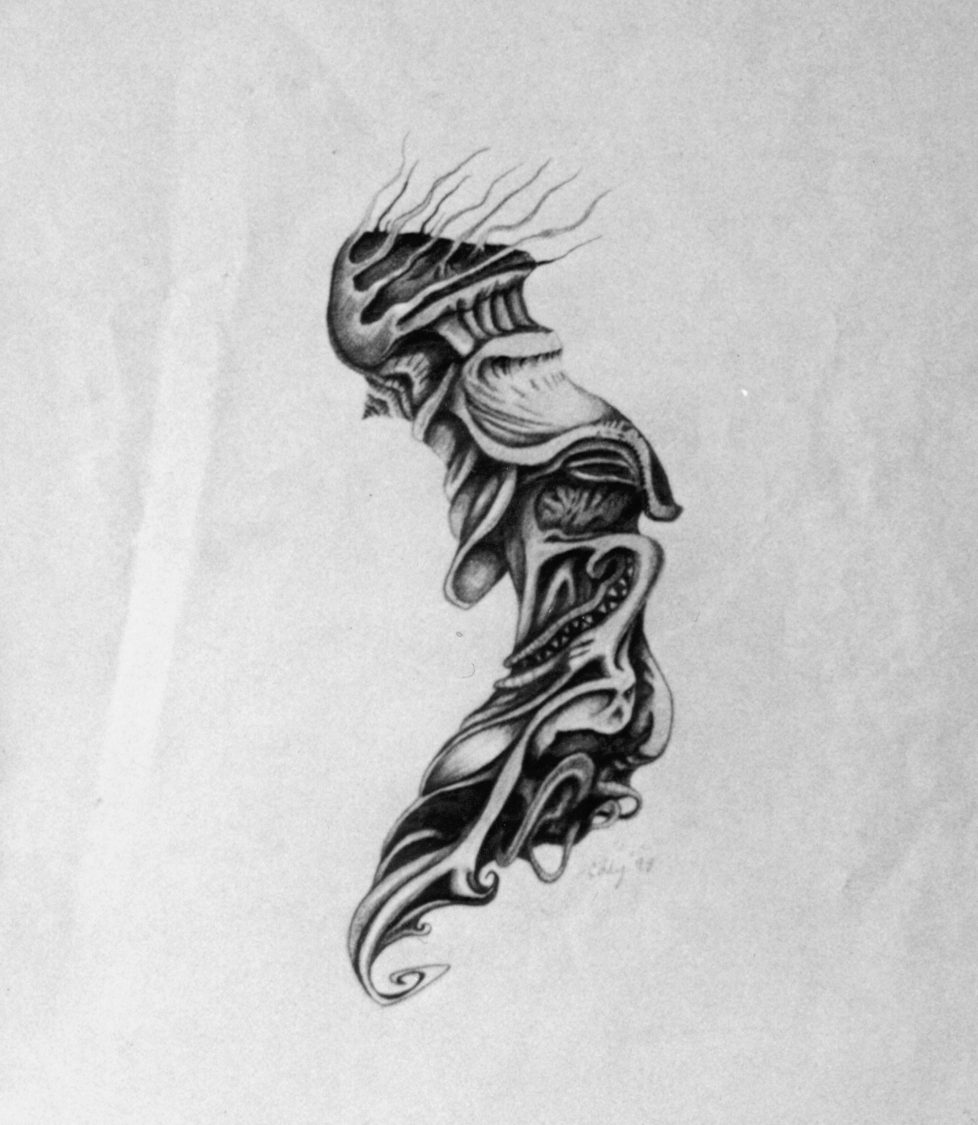
“Creation”, Mechanical Pencil on Paper, 1998
Creation was a genuine phallic emergence; that is to say it clearly summoned a kind of Lingham (an archetype I would learn about years later). I had no notion, idea, or conscious intention to draw a phallus. Yet, one invoked. The integration of symbols, textures, even the suggestion of teeth, were all highly personal components of that organ. They qualified my set of psycho-sexual relationships to it. This was no symbol; it was a true archetype–a corporeal nature projected through the psyche onto paper.
I reveled in art making as a psychological adventure, filled with fantasy, fear, arousal, mysticism–there was no limit. The developing imagery seemed to divulge an internal terrain of the mind which possessed relationships to time and space, not all of which were local to me at that moment. It was to me, profound, that such a transform from the psyche into art medium could be so direct and authentic. I had discovered a landscape which I later learned was a point of reflection by other artists, in particular Roberto Matta, who described it as his Inscape:
“The concept of a psychological-time medium in which the objects are transforming, leads to compare it with an Euclidian space caught in a rotative and pulsatile transformation in which the object, with each risk of interpenetration may oscillate from point-volume to moment-eternity, from attraction-repulsion to past-future, from light-shadow to matter-movement.”
A Roberto Matta painting, for reference:
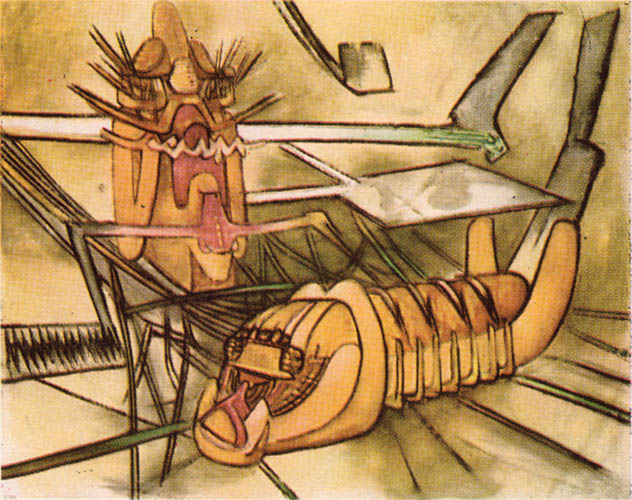
Image creation was no longer premeditated or filtered. I simply had to show up and engage. The art became a feedback process, in real time, which I later termed “psychic surgery”; not only could I now begin to tangibly convert unconscious psychic structures and relationships into visual maps, but I could modify my own consciousness in response; the act of elucidating a psychedelic realization was simultaneously the basis for transforming the psyche.
It is important to note that at this stage of my development, I purposefully insulated myself from anything established in any culture, with respect to art and philosophy. I was in a full deconstruction mode, intending to eliminate as many variables from the “other” as possible. In this way, when I would identify a phenomenon with distinct characteristics, and then later could corroborate it as part of a cultural fabric; I felt that I had therefore provided a sort of audit and proof for the validity of that thing.
In a sense I was attempting to provide a perceptual basis from which to piece together a cosmology.
Some notable artworks from this period:
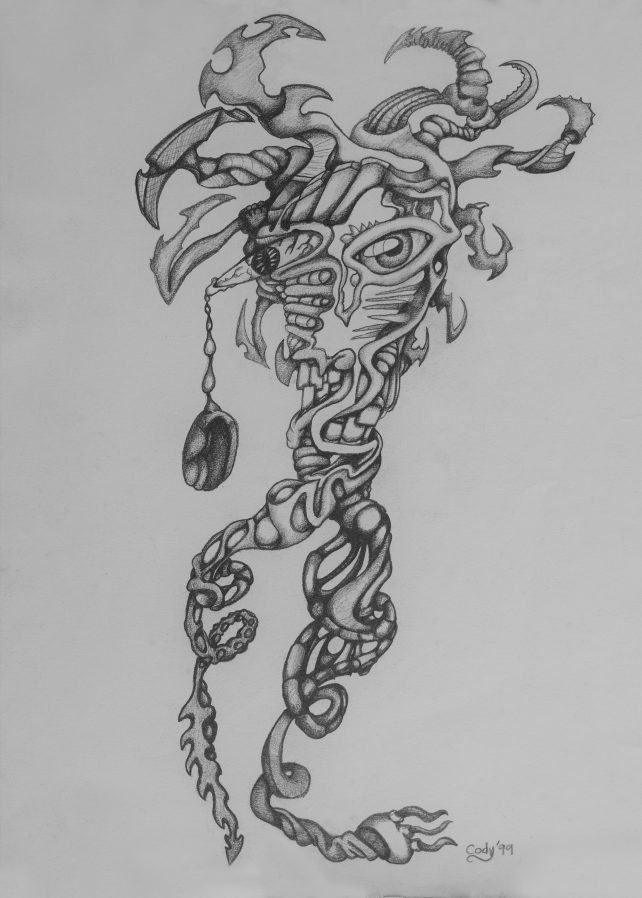
“Deconstructed 21 Year Old Psychology”, Mechanical Pencil on Paper, 1999
“Deconstructed 21 Year Old Psychology” was essentially a mental snapshot of the self, at the time. Note the various hooks at the top of the figure, where the “mind” is, and specifically that they point inward. Note the characteristic differences in the eyes, and the two bottom limbs, one of which gestures toward a kind of devil tail or serrated tail bone. Note the progression of a teardrop into a large mass dragging the left eye into a slant, and the various spikes pointing inward from one side of the being to the other.
This image differs considerably from another figure, which I called “Baby Spark Plug”:
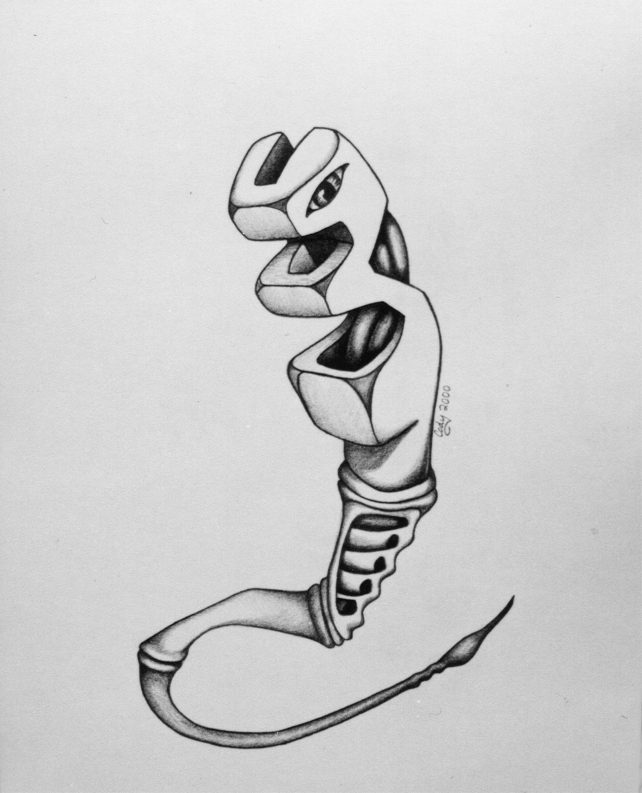
“Baby Spark Plug”, 0.5 Mechanical Pencil on Paper, 2000
and also “Two Year Old Spark Plug”:
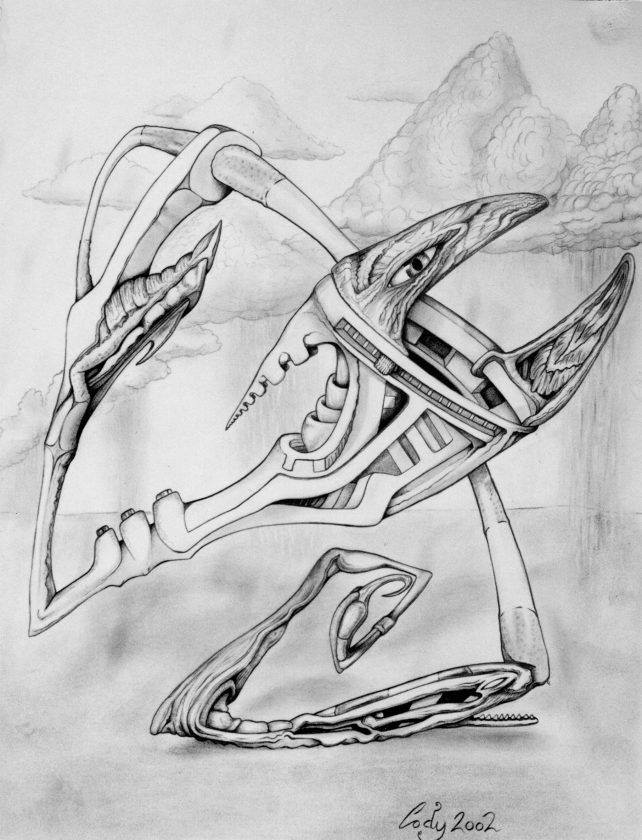
“2 Year Old Spark Plug”, 0.5 Mechanical Pencil and Cigarette Ash on Paper, 2002
Originally “Baby Spark Plug” was just called “Spark Plug”, until the emergence of its matured form, which surprised me two years later. The most prominent key feature to this creature was its venomous stinger. They also share an eye of awareness, and joints/sections to their bodies. Their “personalities” were mildly sociopathic, and attached to a severe defense mechanism.
Particularly in the mature version, the way the stinger curled up in a retracted position; this became by itself a distinct archetype, with iterations in other artworks over time. There is a kind of mythos of this stinger in the lore which developed in my art and writing–though its influence rarely leads anymore to a visual presentation.
Whereas in other spelunking adventures of the mind there have been indulgences in emotions like sadness, loneliness, or self-pity; the Spark Plugs had no such affiliation. They were more technical, mechanical, efficient, and primordial. In the same vein was another portrait:
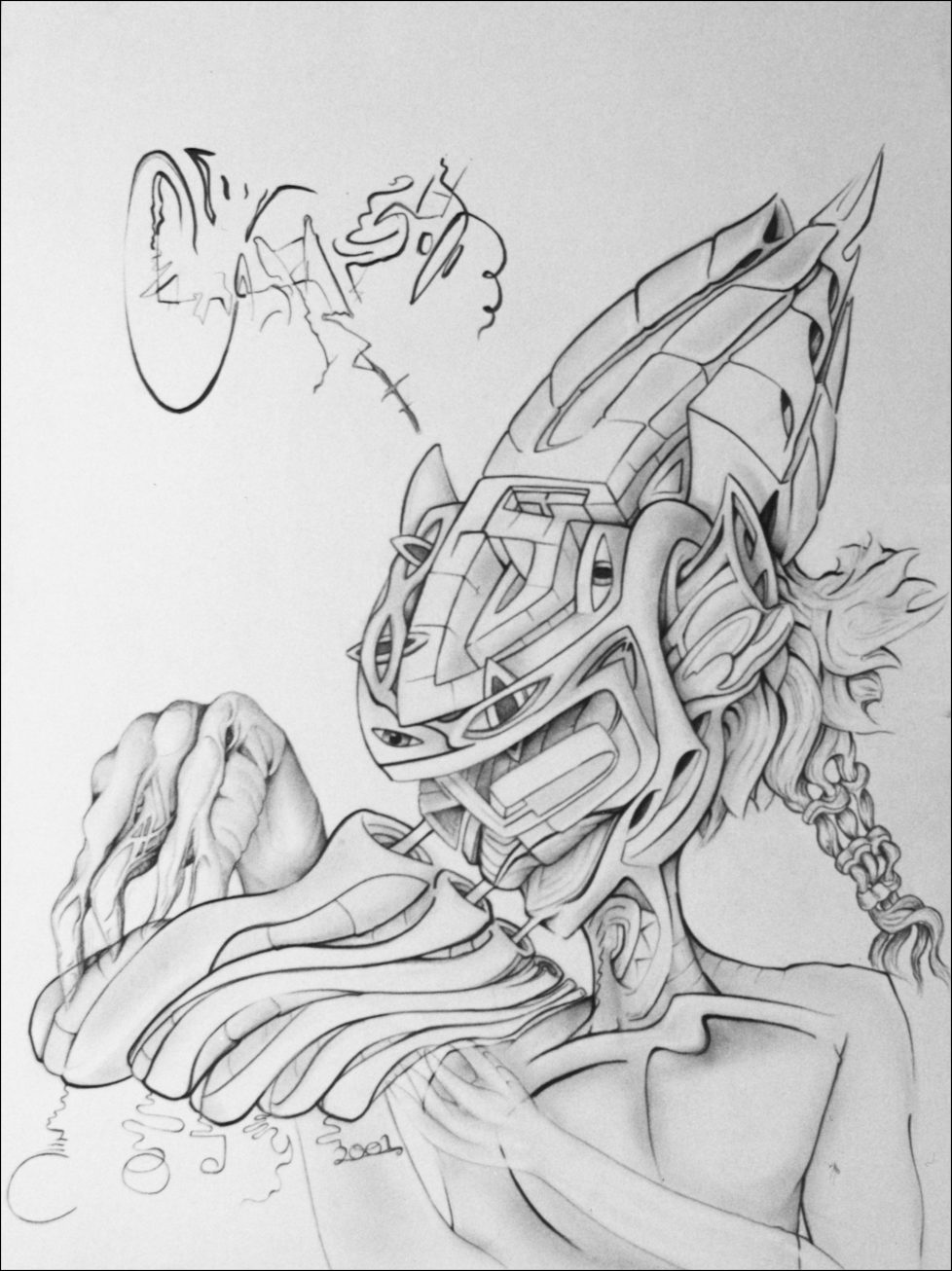
“Transdimensional Elf Head Plays the Pan Pipes”, 0.5 Mechanical Pencil and Black Ebony Pencil on Bristol Paper, 2001
The “Transdimensional Elf Head” was certainly more playful than the “Spark Plugs”. The image reminded more than a couple of my associates at the time of their DMT trips. The structure of its skull, specifically the triangular shape toward the center, occurred in the same context in other works of the time. Taken as a whole, this “Elf Head” portrait has been one of my more alien renditions of a subject.
Another entity which seemed to have an alien or otherness quality to it, and which was somewhat disturbing, debuted in the making of this next piece:
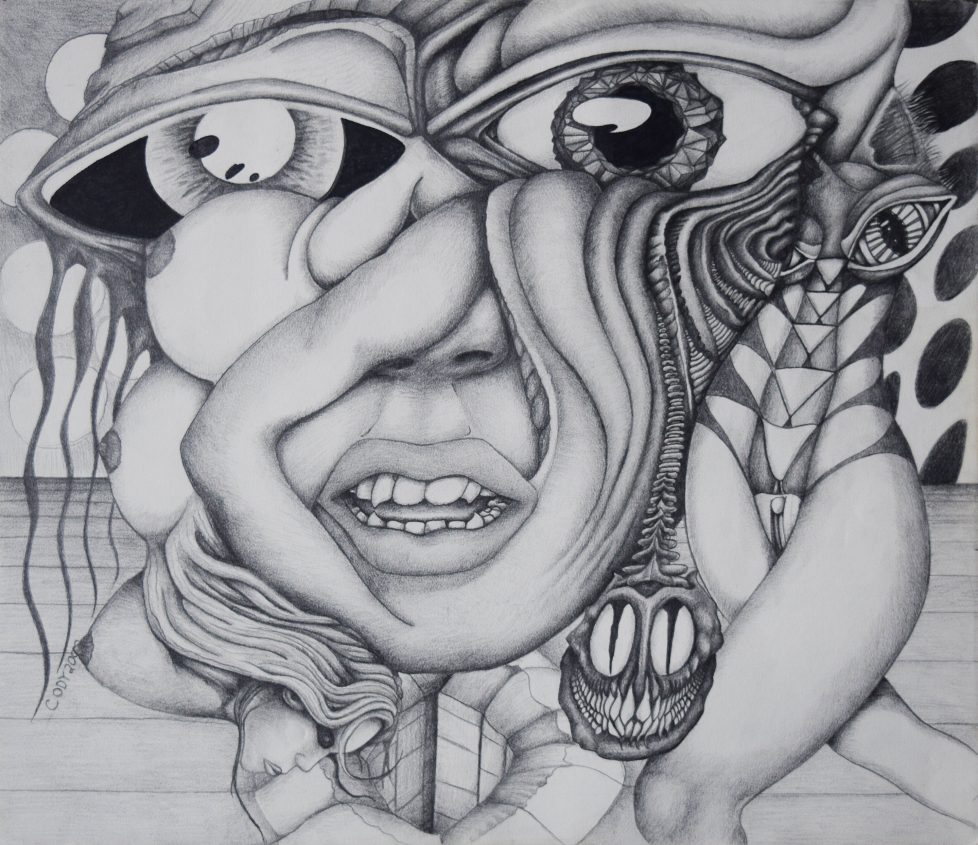
“Feminine Hue”, Pencil on Paper, 2000
“Feminine Hue” was one of several pieces from the time that were basically psychological portraits. Characteristics of the large eyes and feline figure, though honest interpretations born from free association, were relatively superficial in the presence of the actual entity in the room, here seen in the form of a toothy, bony, psycho entity:
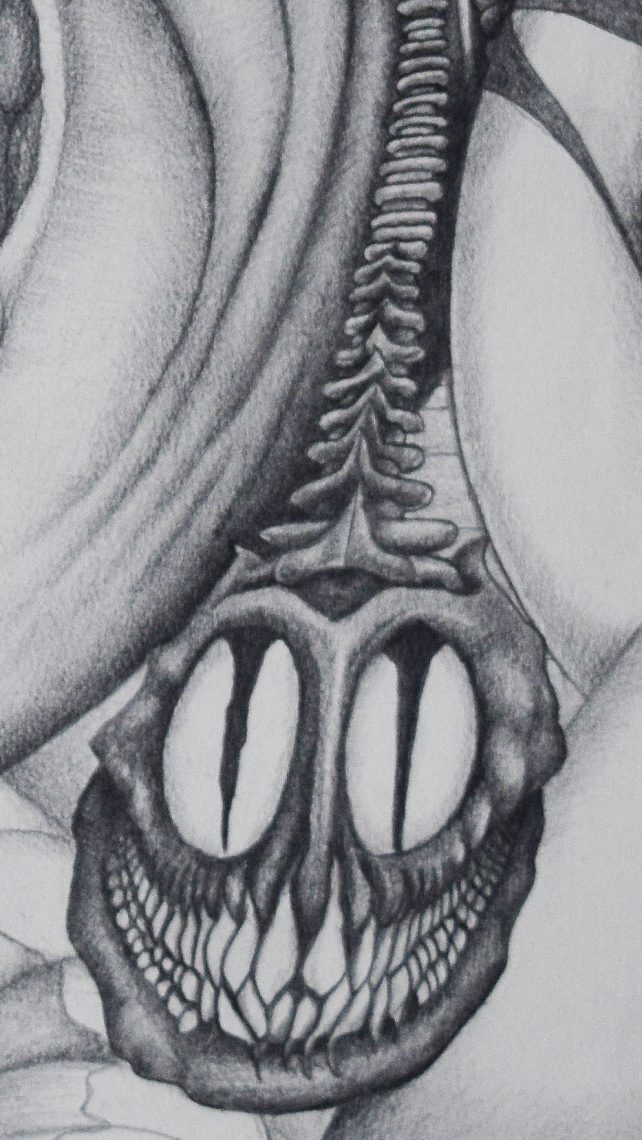
Closeup view of the Psychopathic Smiley Eyes in “Feminine Hue”
In the drawing, this entity emerged as the result of a dense mutational space in the boundary between the central face, and the cat figure. It was not merely associative, but wholly emergent. It definitely felt as though something had snuck into my artwork–even its manner, how it integrated into and grew out from the rest of the image seemed truly parasitic, foreign. It’s psychological characteristic was clearly murderous and oriented in a kind of anti-life equation. It seemed not to predate for typical reasons–the seeking of satiety or sustenance or pleasure. Its qualia was like a superficial face, beyond which is a mind, and in that mind is an intent, and that intent was the contradiction of life and vitality.
Its eyes showed up again in another work later, which I’ll display in a moment. But first a side note:
I thought it was interesting when I spotted Mr. Murder Eyes in 2015 while watching an anime of One Punch Man, season 1. In it, the Deep Sea King briefly flashes this gaze during an explicitly psycho moment:
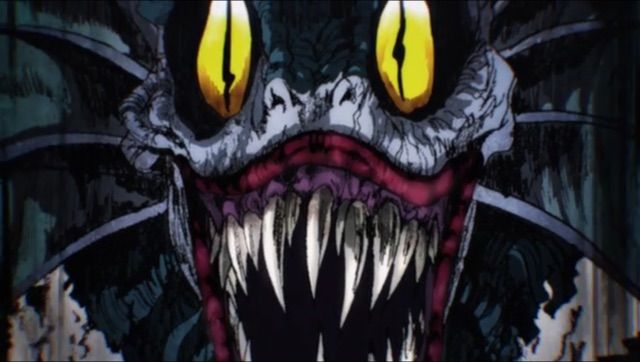
Deep Sea King, One Punch Man, Season 1, Episode 8, 2015
For context, this is the character’s typical form (same episode):
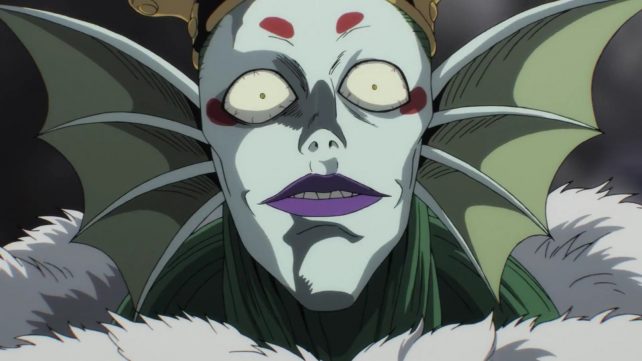
Obviously, this anime iteration is many years after my initial encounter with the psycho eyes. It still shocked me when I saw it, especially how sudden it flashed and at an intense moment in the animation. The intent and presentation were definite iterations of the qualia of my initial toothy entity, but, another facet of this, from my perspective, was that this anime villain was a Sea King, which also relates to the etymology of my last name. Seekins as a surname is related to Seeking though of unknown origin; however, one suspected origin is literally, Sea King. So, you can imagine the mind play I felt watching that episode, especially since I had a drawing in 2001 titled “Sea King Ponders Jesus Fish”, which was a play upon the etymology of my last name.
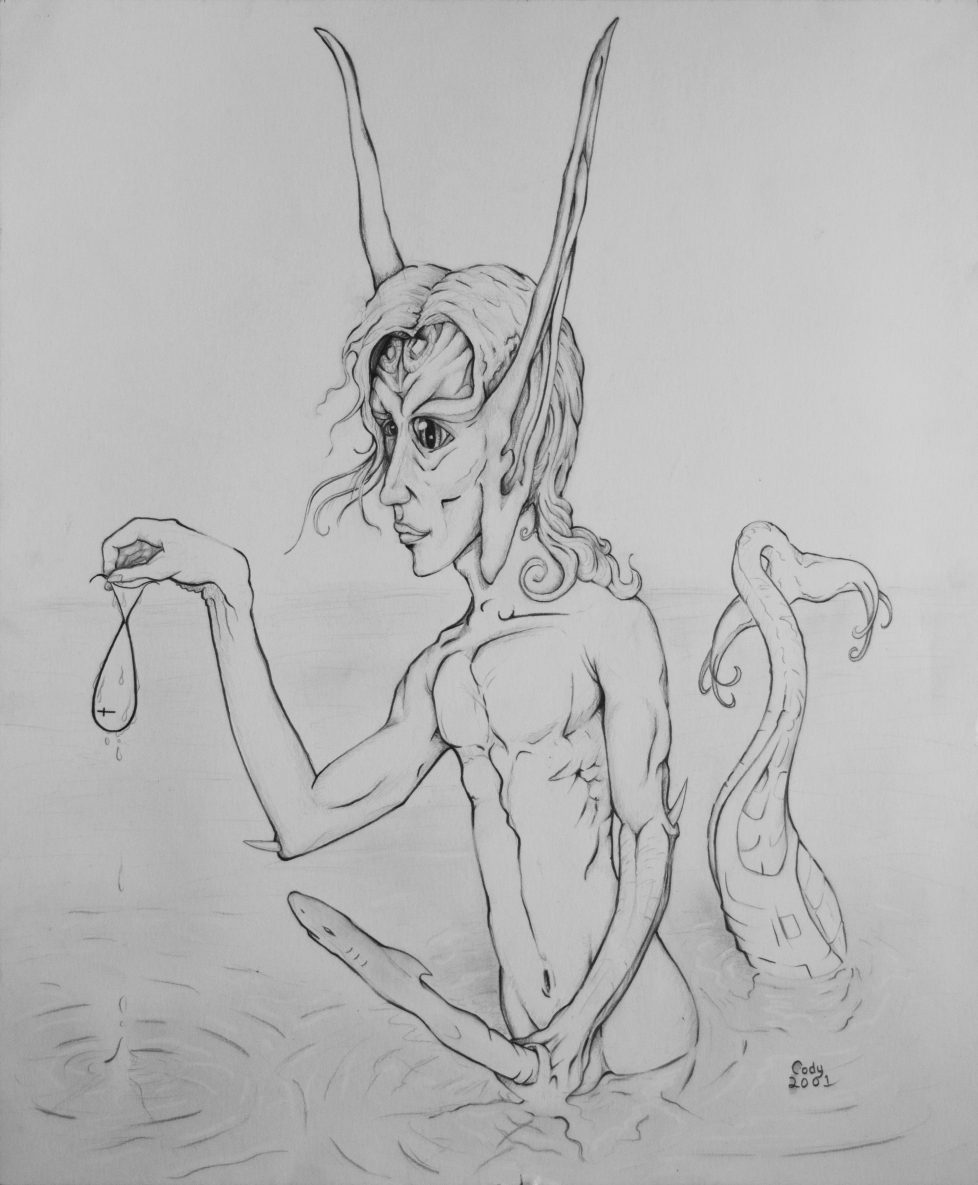
“Sea King Ponders Jesus Fish”, Ebony Graphite and Cigarette Ash on Paper, 2001
I recall being in a particularly high strung, nicotine addled, and ostentatious mood while making that work, thus the extremely large ears…but I digress…
The psycho eyes showed up another time, in an unfinished concept work originally called “The Unrelenting Masochist”:
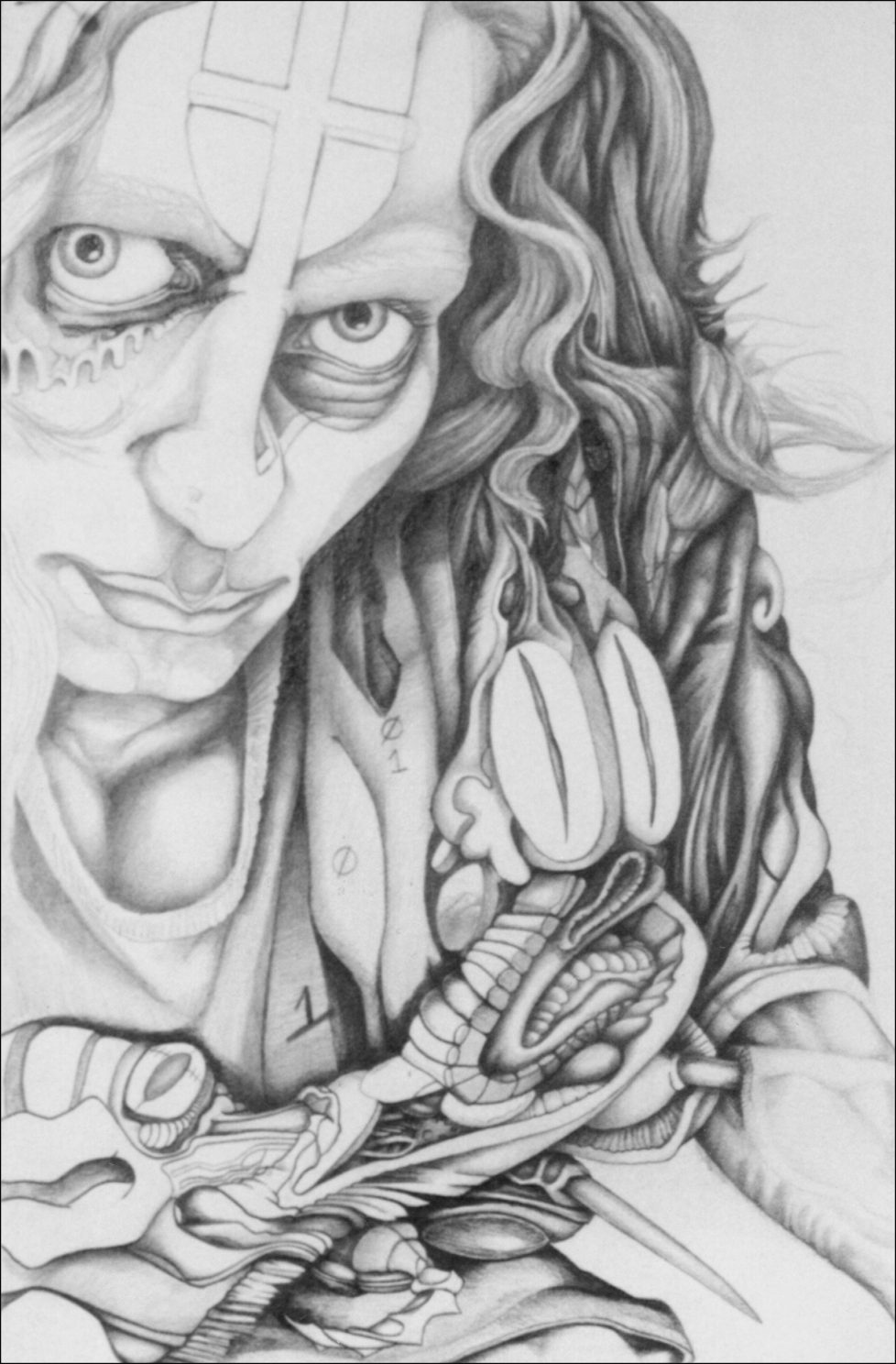 “Transcendent Masochist”, 0.5 Mechanical Pencil on Paper, 2001
“Transcendent Masochist”, 0.5 Mechanical Pencil on Paper, 2001
What inevitably resulted from these encounters was a perception that archetypes which well up from the unconscious do so without a need of a local body or brain. That their particular expression might specially occur through neurology and influence behavior yet retain independence from a particular host, seemed a bit like possession, or at least psychic infiltration. The net impression was a meme-like virus swimming through human mass consciousness as a medium. From this frame animism, Jungian Archetypes, and the multiplicitous nature of Hindu deities seemed quite a bit more plausible as takes on a real objective phenomenon.
My scope now included personal “Psychic Surgery”and the invocation of emergent phenomena. I began to apply this process toward the interpretation of other people. One such example is this next commissioned work:
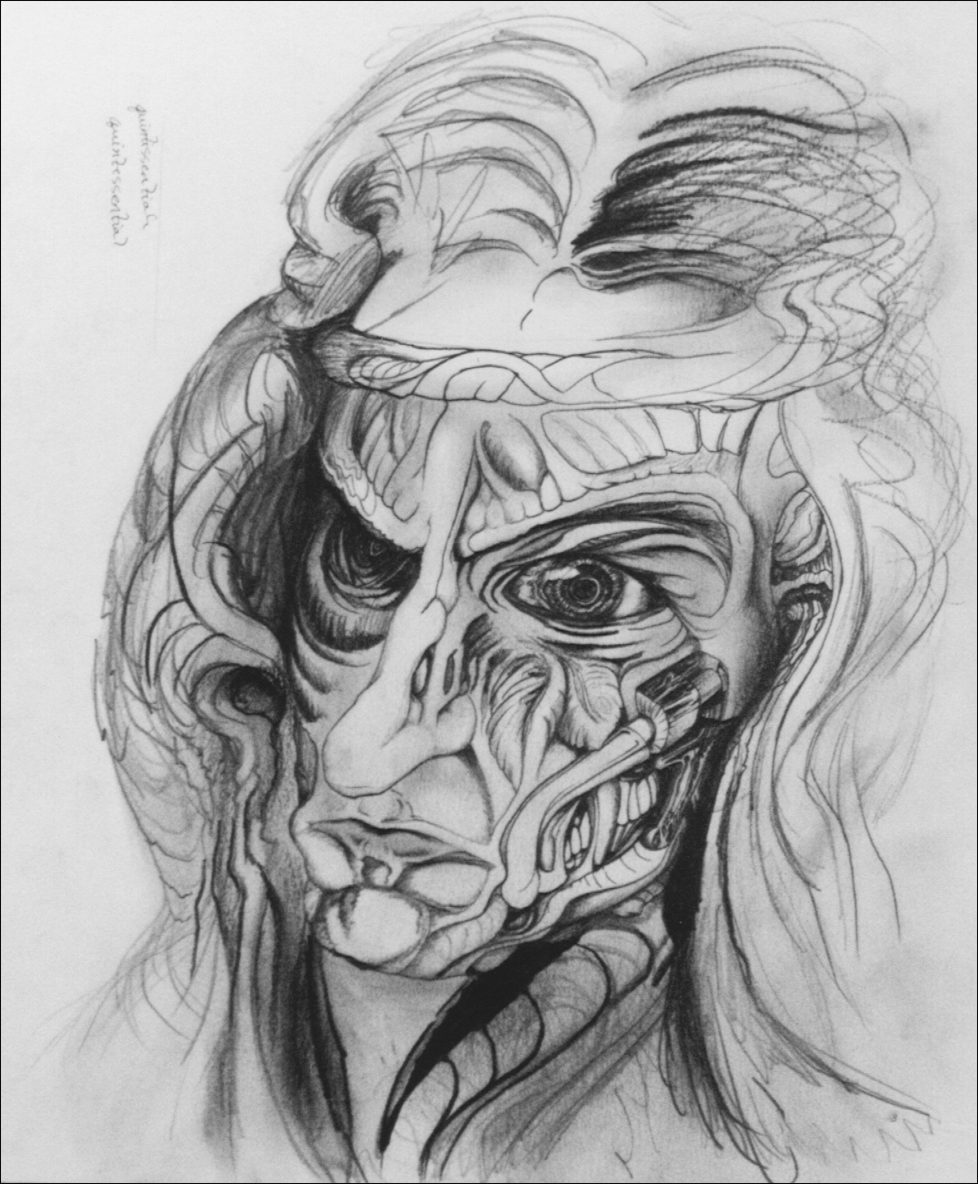
“Portrait of a Blue Jay Shaman”, Ebony Graphite on Bristol Paper, circa 2001
This time the subject was “the other”, and the work was produced in one shot while dosed on a few hits of blotter acid. I remember entering into a space where I was witnessing, like simultaneous reels, my waking experience in the room, juxtaposed against my dream body and environment. In fact I was accessing a dream space I had previously been in months prior during sleep. The patron mentioned that he saw features of his father, who I’d never met, in addition to himself, in the work. The words written on the upper left side are “quintessential”.
I also spent a night making art after taking liquid acid applied to 4 Altoids in a Lawrence, Kansas apartment, in the company of an orange cat. Toward the end of the experience I whipped out this image:
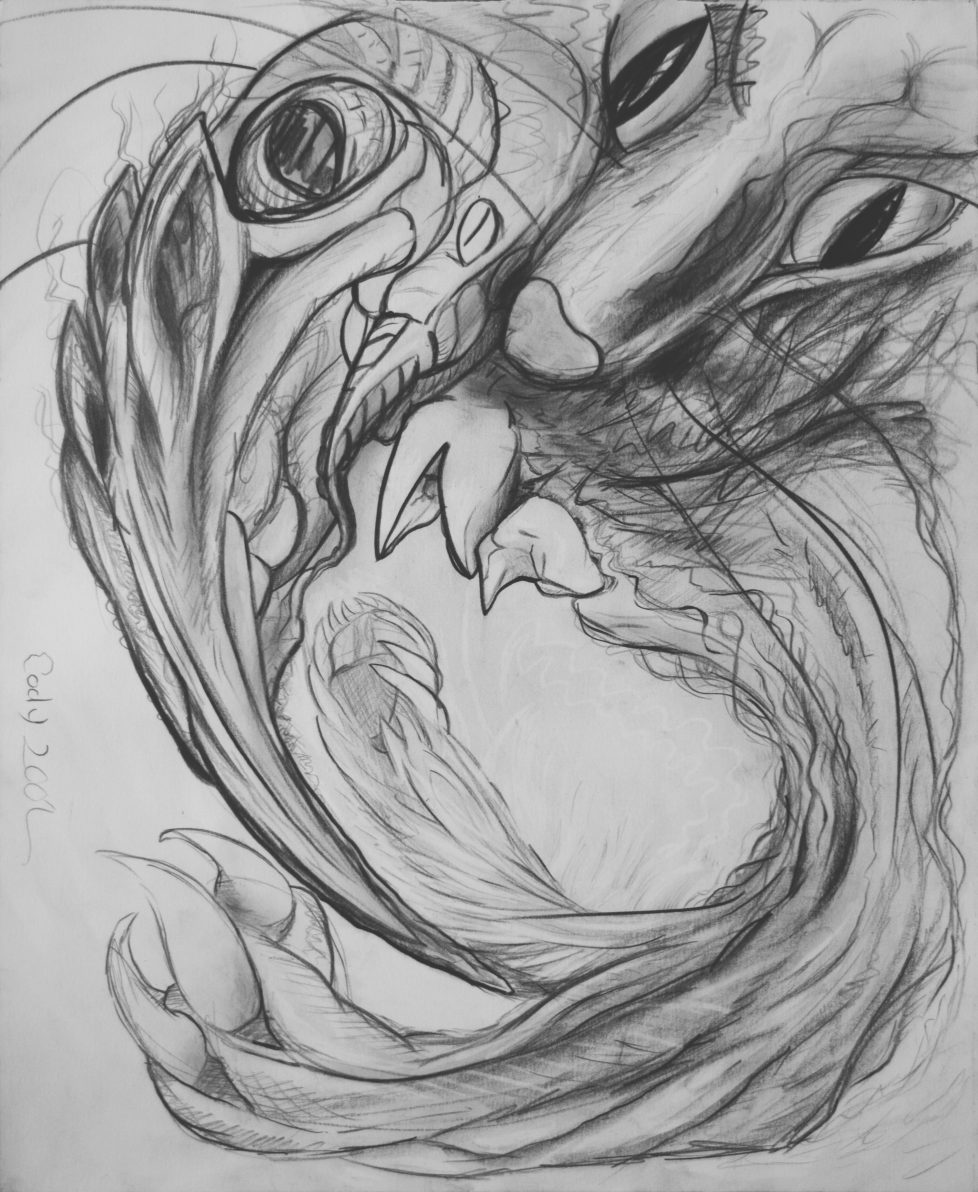
“Yin Yang Kitty”, Ebony Graphite Pencil on Bristol Paper, 2001
This, like the “Blue Jay Shaman” portrait, was also done in one go, energetically. I very much enjoyed the direct nature of the graphite. Moods, music, and thoughts all contributed to affect the kinetic output of the pencil strokes. My work in the early period had often become an ecstatic dance. The making of a piece was an event. I would circle and stalk the paper and later, the canvas. Works commonly were placed on the floor or a tabled platform to allow me to hunt the composition.
It was around this same time, circa 2000, that I began producing oil paintings. My fundamental approach had not changed. Due to how oil paints layer, however, the time involved in addressing each layer extended the amount of work necessary to complete an image. One of the first such oil paintings:
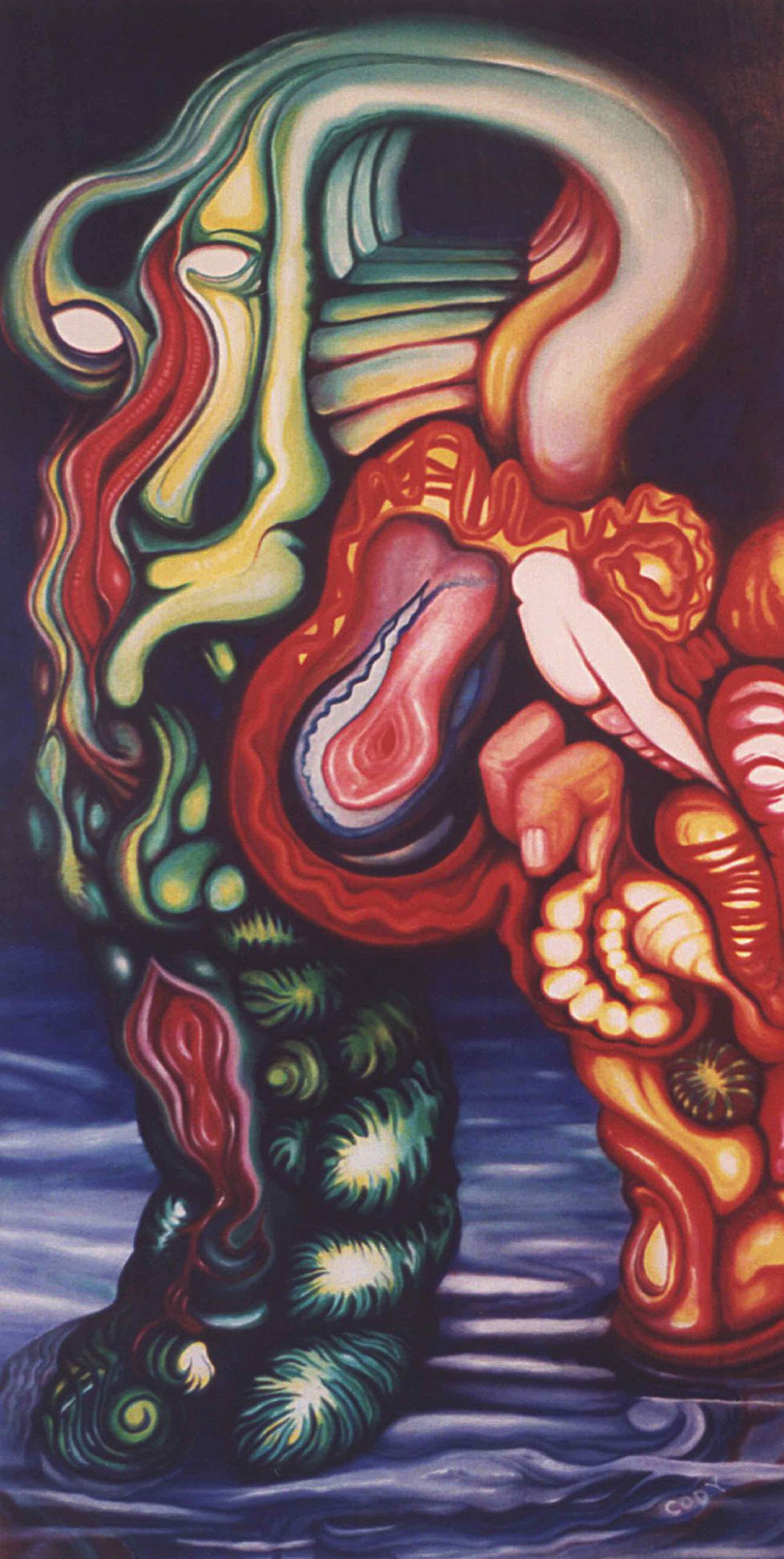
“Tantric Convergence”, Oil on Canvas, 24″ x 48″, 2000
This work did occur under non-ordinary consciousness, but not LSD. The influence of choice for this image was Marijuana. The temperament therefore was less energetic and more methodical.
It wasn’t until about 2003 that I actually started painting as my primary medium of choice. About the same time I’d begun an Academic trek at Wichita State University for Undergrad Studies in Fine Art.
There I began to appropriate and use references to historical artists to begin to include figurative representation to the fold, such as this homage to John Singleton Copley:
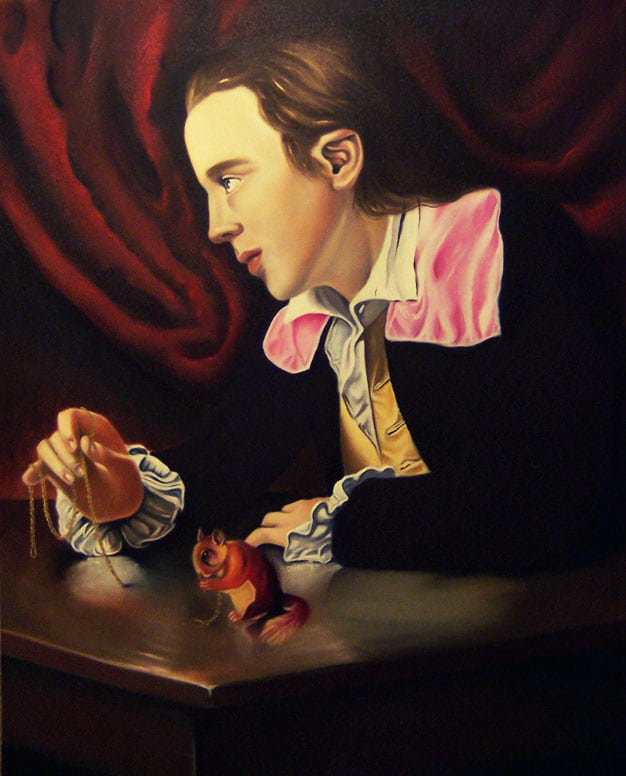
“Copley’s Dreamer”, Oil on Canvas, 24″ x 30″, 2005
Here the malleability typical of my process was severely de-emphasized, materializing mostly as subtle surrealism, such as the chain dipping into the table surface.
2006 marked a transitional period in my development with an incredibly inspired psychedelic work which I called “Transmigration” in recognition of it as a nexus between my early developments and what would be new evolution to come.
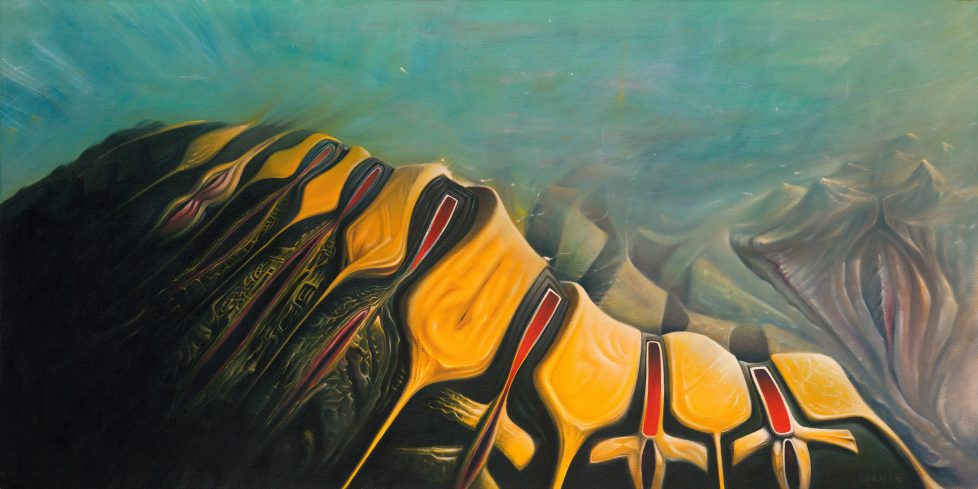
“Transmigration”, Oil on Canvas, 24″ x 48″, 2006
“Transmigration” was a wholly emergent creature; much of its iteration the result of an ecstatic dance buoyed by LSD and random music streaming from channels on SomaFM. It is perhaps impossible to genuinely describe the serendipity which flavored its production; however, just as this image emerges from darkness as if unto a dawn, so, too, a shift occurred in my sense of possibility as a painter.
Immediately that year I created two more pieces, one of which was an integration of “Transmigration” and my appropriation of classical art imagery:
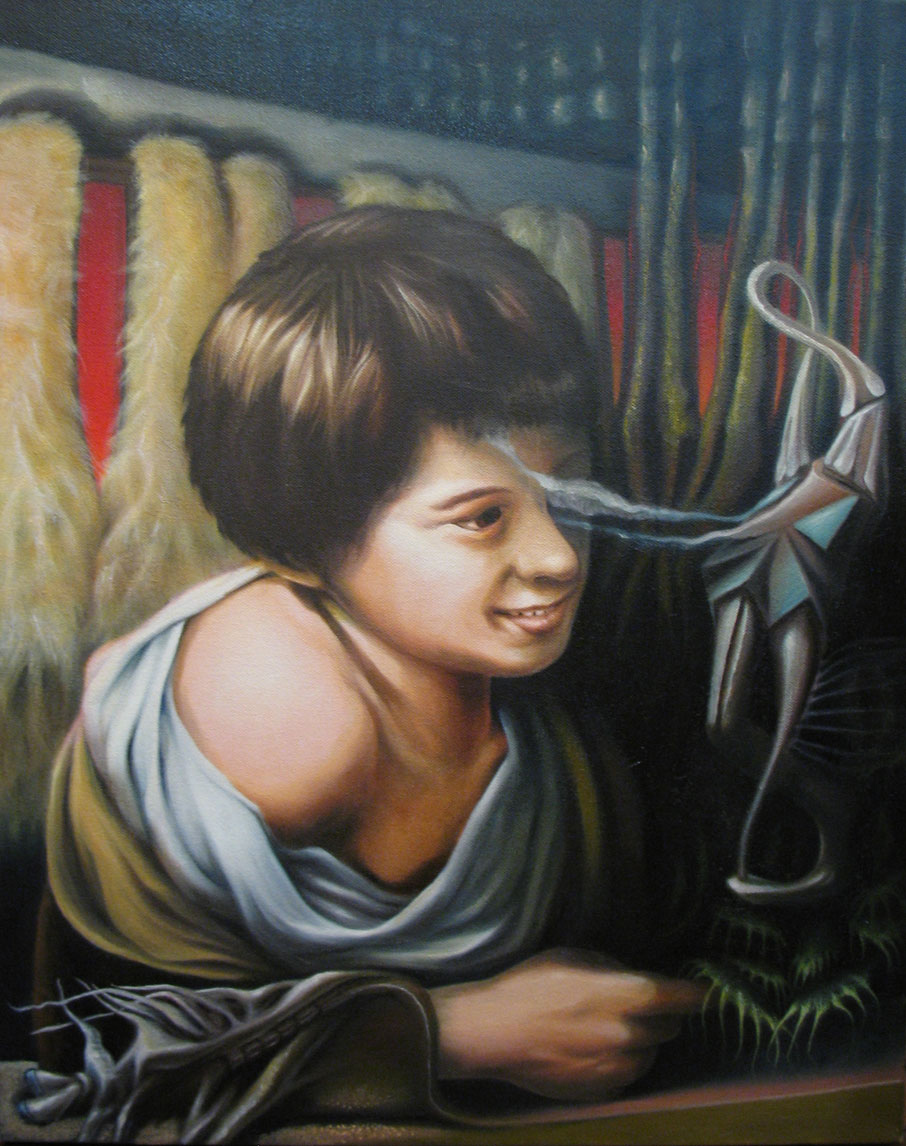
“Murillo’s Urchin”, Oil on Canvas, 20″ x 26″, 2006
The work was a visual allusion and homage to the baroque painter, Bartolomé Esteban Murillo, and to classical periods, more generally.
The other painting I created that year was for me at the time particularly ambitious, a 30″ x 60″ rendition of Romanticist William Adolphe Bouguereau’s “Cupidon”, as Romanticism was, and largely still is, one of my most enjoyed periods of art.
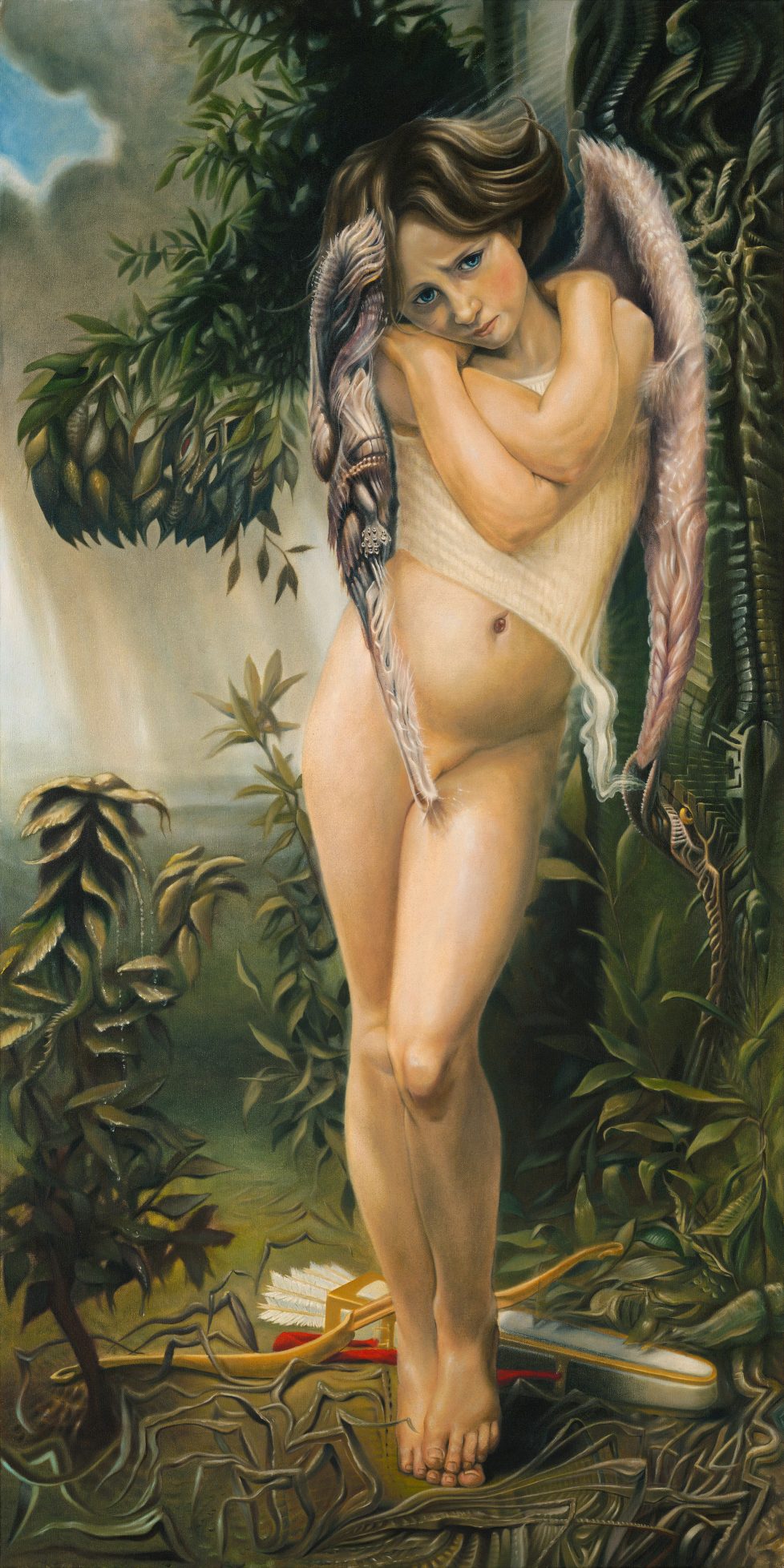
“Internal Reflections of a Self-Aware Cupid”, Oil Paint on Canvas, 30″ x 60″, 2006
The painting took me about six months to produce. Its production blended both ordinary and non ordinary awareness into the work sessions. It was the last painting I produced while in Undergrad before I traveled to Thailand for the first time.
Some closeup images:
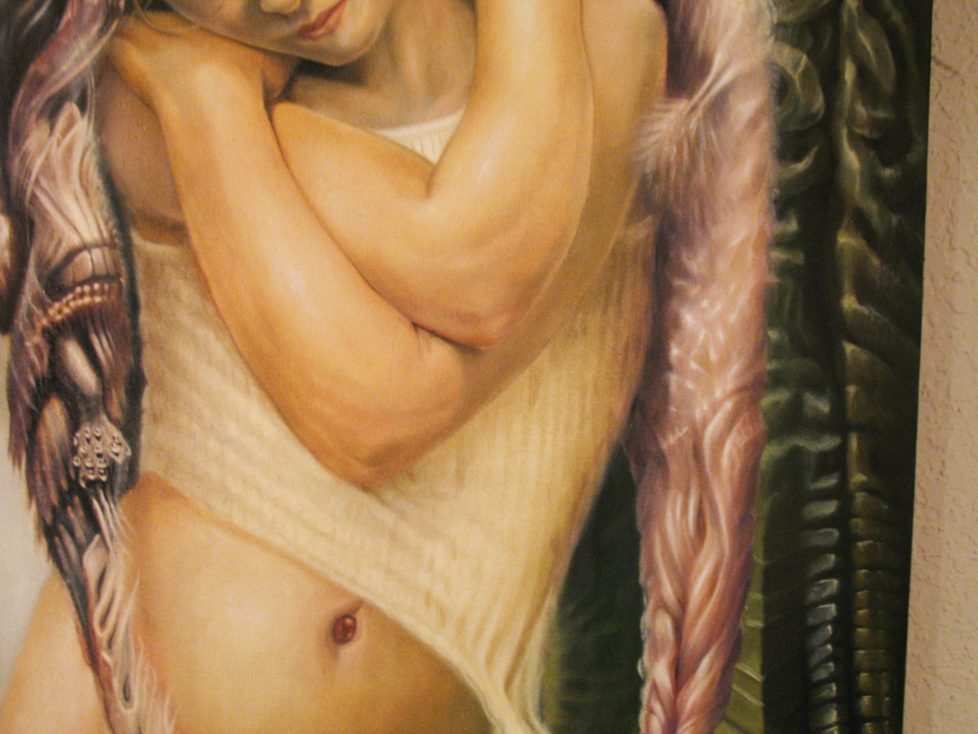
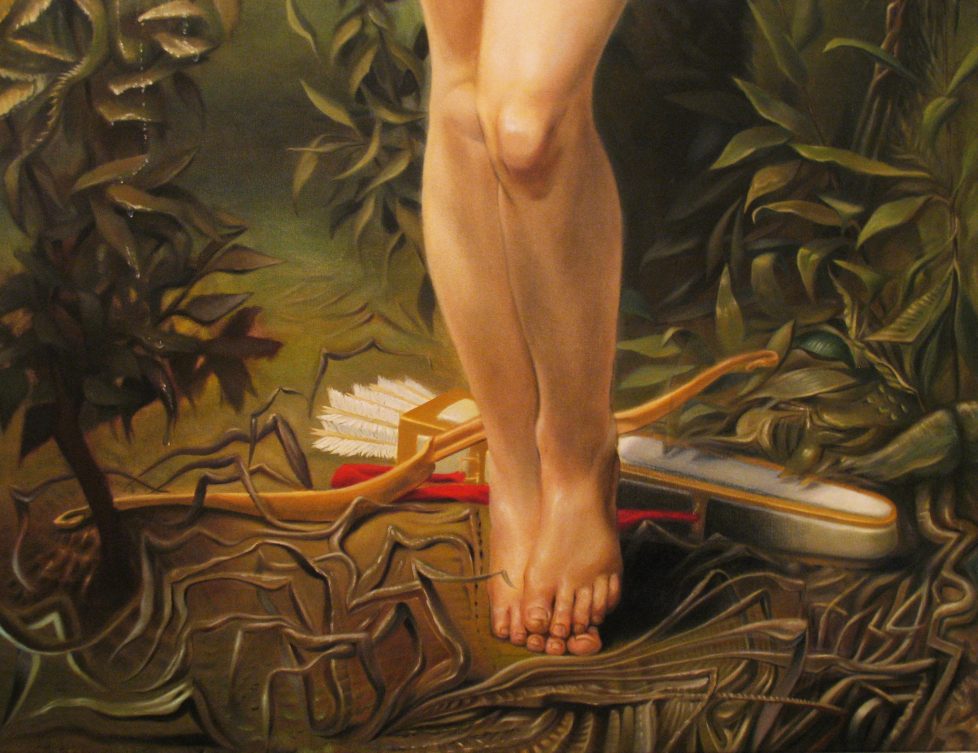
The bottom region of the painting surrounding the feet of the figure echoed much of the visionary inspired rhythms of “Transmigration”. My body would fall into sync with music and impress itself as a stroke, continuously, for hours and hours of blending until patterns and forms emerged. Though I was light years away from the figurative talent of Bouguereau, it was also a sublime pleasure to take care in rendering the feet.
In January of 2007 I traveled on foreign exchange to Thailand, living in Bangkok for 6 months. In addition to studying Buddhist Institutions at Thammasat University, and exploring a variety of sites, I also continued my intention to begin integrating the “other”, in this case Thai cultural influences, into my work. The marriage of this intention produced “Transgender Buddha Faces Mara”:
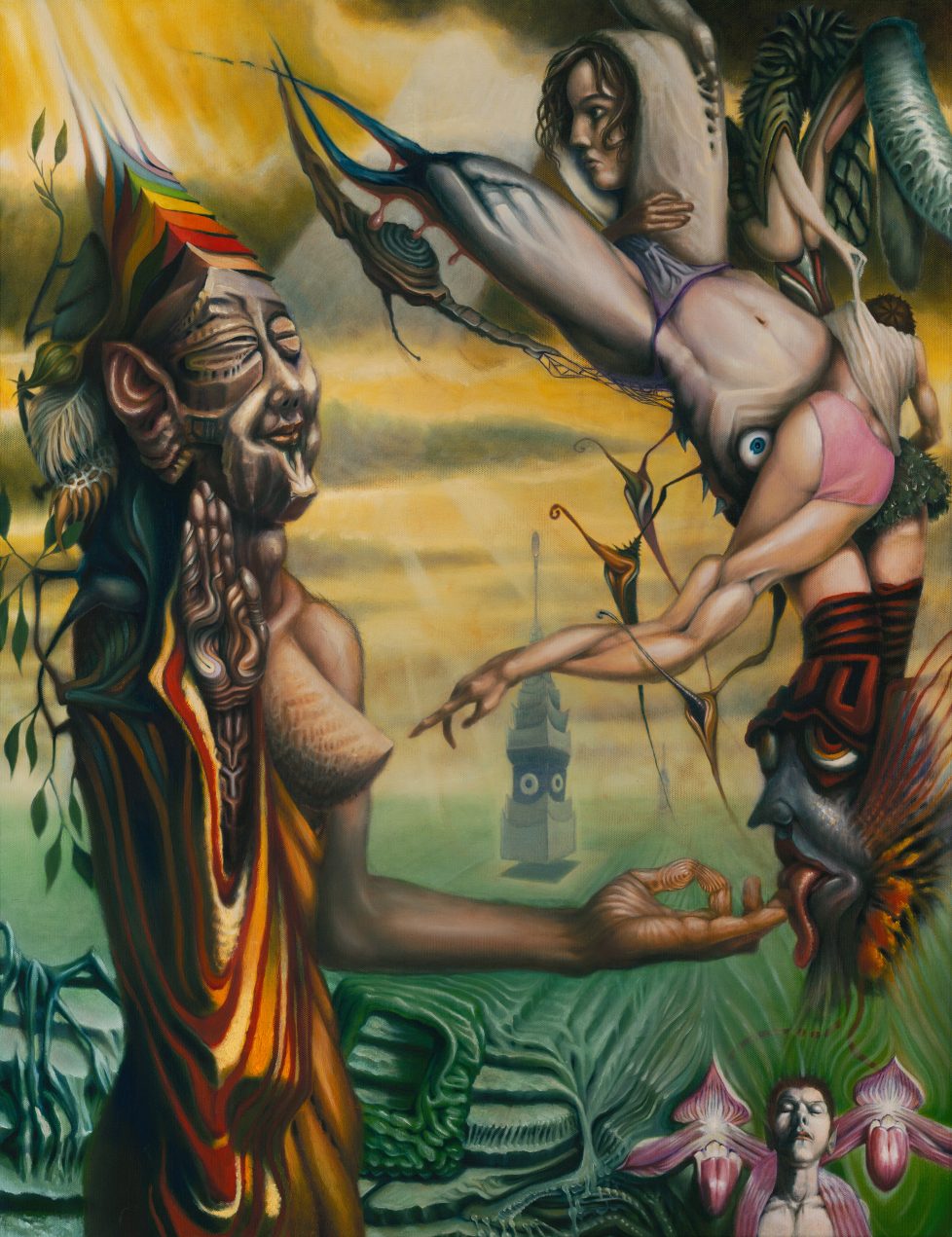
“Transgender Buddha Faces Mara”, Oil on Canvas, 28″ x 36″, 2007
The narrative premise of this piece lay on the left side with a Katoey rendition of Buddha in contest with Mara, in a famous story of overcoming earthly temptations and threat. The mudras (hand gestures), orchids, robes, and much more were all integrated from impressions during my stay.
By 2008 I had obtained my BA in Studio Art from WSU. Despite the degree, I felt that the ideology of the school at the time was inimical to my learning process as an artist, being wholly more concerned with specious concepts over refinement of studio skill.
I spent a number of years working a variety of jobs, including junk hauling, before moving to Maryland in 2009. There I worked for Covance briefly before becoming an adjunct professor at Frederick Community College.
In 2010, while working at Covance, I began what would be my next major period in art. The seminal piece, titled “Budgie-Sattva 2”, is shown below:
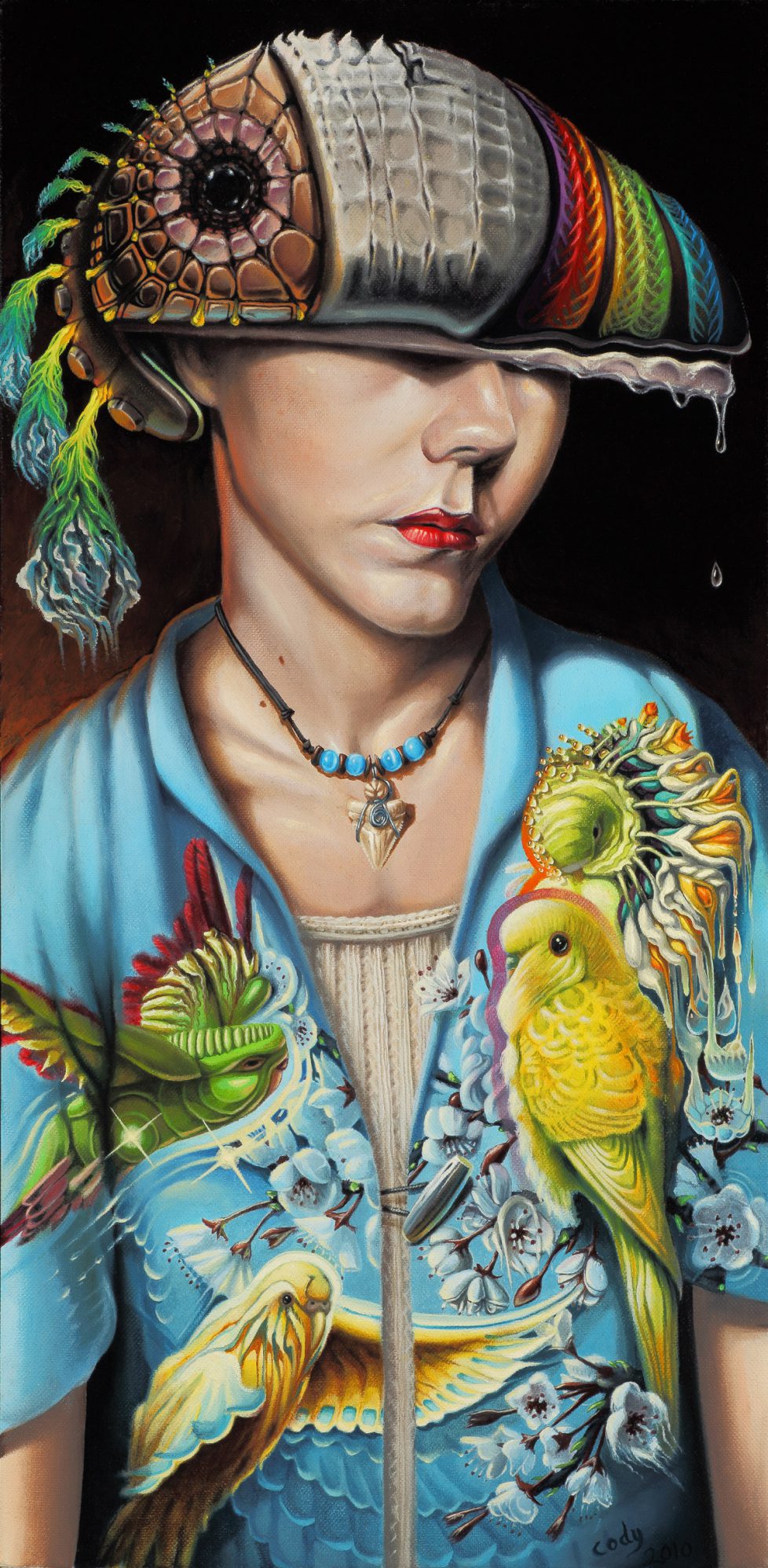
“Budgie-Sattva 2”, Oil on Canvas, 12″ x 24″, 2010
And with that, I will bring this part of my story to a close. Stay tuned for more, in part 2, where we will explore the “Jataka Tales of a Budgie-Sattva”!